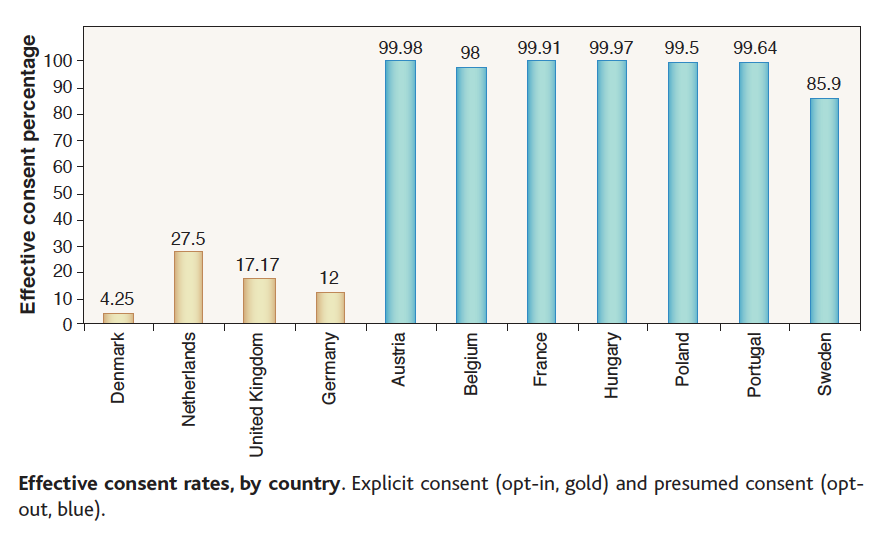A cousin of mine who was a casualty surgeon in Manhattan tells me that he and his colleagues have a one word nickname for bikers: Donors. Rather chilling.
“Paperweight” by Stephen Fry
Organ donation is Germany is a controversial topic. There are not enough organs to go around and some scandals undermined the trust in the donation system. What’s worse, the solutions are mediocre at best. The health care providers send around letters(!) with a organ donation card. If you want to donate your organs, you are expected to fill it out and carry it with you — or put it where it can be found.
Personally, this is one of the moments when I think that it’s not that too few people want to donate their organs after they are dead. Perhaps the health care providers want to keep the number of donated organs artificially low. From a cynical point of view, this would make sense if the costs of transplanting an organ and the follow up costs are higher than a person dying because no organ was “available”.
Because there is a decade old solution to this problem.
In 2003, Johnson and Goldstein wrote an article in Science, asking whether defaults save lives. They compare, among others, the consent rates in different countries by whether thy have an opt-in or an opt-out rule. In an opt-in country, you have actively say that you want to donate your organs after you are dead, in opt-out countries your consent is presumed unless you actively decide against it.

The differences are … striking. With all the risks of this not being an experiment, it’s hard to imagine another reason between the countries regarding the differences in consent than whether it’s opt-in or opt-out.
Unfortunately, Johnson & Goldstein’s finding, despite being cited in a TEDtalk, do not seem to have found widespread recognition. After all, if you really would want to have more donation organs, changing the policy from opt-in to opt-out would be the most effective way to ensure it.
And sure, there are criticism to opt-out. For example, looking at the positions of the political parties regarding this topic (it was asked as a question for the European Parliament election), there are a few. There are parties who think this is a very personal decision that should not be “forced” — a person should not even be “forced” to make up his/her mind. The distrust due to the scandals is another issue.
But personally, I don’t understand why there aren’t simply three possible decisions:
[X] I want to be an organ donor (default)
If you do not want to be an organ donor, check one of the following two checkboxes. It will render the one above invalid.
[ ] I do not want to be an organ donor
[ ] I do not want to decide now
In case a person decides against being an organ donor, fine(*). If the person does not want to make up his/her mind, also fine(*). That option is provided to escape the “force people to chose” argument. Yup, it still “forces people to chose”, it forces them to admit they do not want to chose.
I do not know how such a choice, e.g., provided when people get their drivers license or their new passport, would influence consent. It might be that the “I do not want to decide now” option obliterates the usual opt-in, opt-out effects. But I guess it would work. At the very least, it’s a better system then sending out plastic cards.
If people do not care whether they become organ donors or not because it’s all the same to them, then let them save lives by default.
Literature
Johnson, E. J., & Goldstein, D. (2003). Do Defaults Save Lives? Science, 302(5649), 1338–1339.
(*) In the sense of:
“You know what ‘fine’ stands for, don’t you? Fucked-up, Insecure, Neurotic, and Emotional.”
John Bridger in “The Italian Job”
and yup, I would love to institute a “if you don’t give, you don’t get” penalty. But I guess that has no chance of succeeding and might actually be detrimental to organ donations. Still, I think Terry Pratchett’s Igors in “Monstrous Regiment” had a point:
The Igors had a motto: What goes around, comes around. You didn’t have to pay them back. You had to pay them forward, and that, frankly, was the bit where people got worried. When you were dying, an Igor would mysteriously arrive on the doorstep and request that he be allowed to take away any bits urgently needed by others on his ‘little litht’. He’d be quite happy to wait until the priest had gone and, it was said, when the time came he’d do very neat work. However, it happened quite often that when an Igor turned up the prospective donor took fright and turned to Nuggan, who liked whole people. In which case the Igor would quietly and politely leave, and never come back. He’d never come back to the whole village, or the whole lumber camp. Nor would other Igors. What goes around comes around — or stops.
“Monstrous Regiment” by Terry Pratchett
But yup, why use blunt force if changing the defaults works much better.